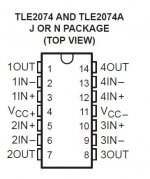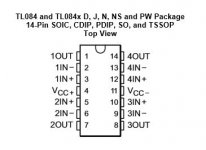Hi All,
I have an electronic xo and servo circuit board that was built around the TL084 opamps that is very noisy. Using the high pass section in the unit to the HF amp and not using the HF section in the unit is night and day different however I would like to high pass my speakers as intended by the unit.
My concern is the actual circuit and layout is the cause of the noise and not the TL084. However it is easier to try a different opamp first before I go down the path of redesigning the whole circuit and PCB.
Is there a pin compatible opamp for the TL084? The TI website says a replacement is the TLE2074 however it is a different package.
Anyone know of an adapter to an 8 pin dip?
I have an electronic xo and servo circuit board that was built around the TL084 opamps that is very noisy. Using the high pass section in the unit to the HF amp and not using the HF section in the unit is night and day different however I would like to high pass my speakers as intended by the unit.
My concern is the actual circuit and layout is the cause of the noise and not the TL084. However it is easier to try a different opamp first before I go down the path of redesigning the whole circuit and PCB.
Is there a pin compatible opamp for the TL084? The TI website says a replacement is the TLE2074 however it is a different package.
Anyone know of an adapter to an 8 pin dip?
I have an electronic xo and servo circuit board that was built around
the TL084 opamps that is very noisy.
Can you post the schematic?
The TLE2074 (Excalibur series) should be a direct swap for the TL084 although I doubt it would make much difference to your problem.
The 084 denotes a quad opamp in a 14 pin package and so I'm puzzled why you mention 8 pin DIP.
That is the easiest to try first. Lets just hope we can get lucky and have an easy fix for once.
Because I am a hobiest and not a professional so I made a mistake (happens often
Can you post the schematic?
Post, no. Not my circuit to share.
However if the opamp swap doesn't work I will be redesigning (reads: guessing real hard and most likely many times) it.
If you don't mind me asking, what is the difference between the part numbers?
tle2074 Stock and Price by Distributor
In the 14DIP package there are various part numbers...
TLE2074CN
TLE2074ACN
TLE2074AIDW
TLE2074IN
Any suggestions on which would be best for an XO and "comparitor" circuit?
tle2074 Stock and Price by Distributor
In the 14DIP package there are various part numbers...
TLE2074CN
TLE2074ACN
TLE2074AIDW
TLE2074IN
Any suggestions on which would be best for an XO and "comparitor" circuit?
Can you post the schematic?
Or a photo of the circuit board in question.
My gut instinct would be to say a OPA1644 to replace any of the TL series. But that's a SOIC package.
Or a photo of the circuit board in question.
My gut instinct would be to say a OPA1644 to replace any of the TL series. But that's a SOIC package.
Keep in mind that this was a PROTOTYPE. It was made for me before the engineer passed.
https://goo.gl/photos/VnF3n6PSeCrfrSoU7
If you don't mind me asking, what is the difference between the part numbers?
tle2074 Stock and Price by Distributor
In the 14DIP package there are various part numbers...
TLE2074CN
TLE2074ACN
TLE2074AIDW
TLE2074IN
Any suggestions on which would be best for an XO and "comparitor" circuit?
For general purpose use there will be no difference. Its all in the data sheets, some of there differences are tighter control of input offset voltage over extended temperature ranges.
I doubt swapping the opamp alone is going to make much difference tbh. Much depends on how the gain of the signal path is configured. If this stage couples directly to a power amp for example then you may well hear audible hiss, particularly if the power amp gain is high.
Attachments
One pin compatible lower noise op amp in 14 pin DIP package is On Semi MC33179P, also ST prefix and N suffix from ST (thompson). If power is not a problem MC33079P and ST33079N. I've used the 8 pin DIP version to reduce noise over NJM4558D.
These 33079 don't have the FET inputs of the TL084 but in a speaker crossover I doubt that high source impedance is a problem. Guitar pickups and science instruments need FET input op amps. Audio applications don't need the low offset voltage of A suffix parts, since capacitor coupling in and out to block DC voltage is normal. Offset voltage is a DC voltage.
You may need closer power supply decoupling with 0.1 uf ceramic caps. You may also need an addidional 33 pf (or 22 to 47 pf) ceramic cap parallel the feedback resistors. These op amps have high slew rate and can oscillate. Mine did when I replaced 4558. The feedback resistor is the one from output to minus input.
Don't forget sockets when replacing the op amp, so you can back up or try other options without risking damaging the board again. I like the phosphor bronze contact sockets from TE, so the pins don't oxidize in five years or so.
On hiss patrol, a low hanging fruit is any carbon comp or carbon film resistors 100 kohms or higher. Metal film resistors have much lower inherent hiss. I've used ones from Vishay, Multicomp, and Welwyn without problem.
When removing old IC's, it is usual to cut the pins off and remove them one by one to avoid damaging the board. Wastes a $1 IC, but such is life. If you might back up, get the replacement TL084 on the same order as the MC33079 or whatever, to avoid another $10 freight charge. Plus bigger orders avoid the deadly "handling charge" placed by distributors on small order. And order from a major distributor like newark, mouser, digikey, alliedelec, arrow to avoid the counterfeiting rampant on e-bay.
Good luck persuing your goal.
These 33079 don't have the FET inputs of the TL084 but in a speaker crossover I doubt that high source impedance is a problem. Guitar pickups and science instruments need FET input op amps. Audio applications don't need the low offset voltage of A suffix parts, since capacitor coupling in and out to block DC voltage is normal. Offset voltage is a DC voltage.
You may need closer power supply decoupling with 0.1 uf ceramic caps. You may also need an addidional 33 pf (or 22 to 47 pf) ceramic cap parallel the feedback resistors. These op amps have high slew rate and can oscillate. Mine did when I replaced 4558. The feedback resistor is the one from output to minus input.
Don't forget sockets when replacing the op amp, so you can back up or try other options without risking damaging the board again. I like the phosphor bronze contact sockets from TE, so the pins don't oxidize in five years or so.
On hiss patrol, a low hanging fruit is any carbon comp or carbon film resistors 100 kohms or higher. Metal film resistors have much lower inherent hiss. I've used ones from Vishay, Multicomp, and Welwyn without problem.
When removing old IC's, it is usual to cut the pins off and remove them one by one to avoid damaging the board. Wastes a $1 IC, but such is life. If you might back up, get the replacement TL084 on the same order as the MC33079 or whatever, to avoid another $10 freight charge. Plus bigger orders avoid the deadly "handling charge" placed by distributors on small order. And order from a major distributor like newark, mouser, digikey, alliedelec, arrow to avoid the counterfeiting rampant on e-bay.
Good luck persuing your goal.
Last edited:
Depending on the impedance of the feedback network for the OP's multiple-feedback or Sallen-Key filters (high R means small C), it's very possible that the lowest noise for his system will be something like an OPA1644 (SOIC) on a DIP14 adapter.
Mooly's point to a very high gain power amplifier is not to be missed, either.
Mooly's point to a very high gain power amplifier is not to be missed, either.
For general purpose use there will be no difference. Its all in the data sheets, some of there differences are tighter control of input offset voltage over extended temperature ranges.
I doubt swapping the opamp alone is going to make much difference tbh. Much depends on how the gain of the signal path is configured. If this stage couples directly to a power amp for example then you may well hear audible hiss, particularly if the power amp gain is high.
So I can order any of the opamps. I DO understand that swapping the original TL084 with the newer TLE2074 may provide zero benefits but again it is the first step in trying to fix issues. The next step is a bigger can of worms...
Power amps are standard Hypex UcD's...
The circuit should be checked for HF oscillations. They often reflect in additional noise.
Any suggestions for a PC based Oscope to test with? My trusty old Fluke 87 won't measure that. LOL
An analog VOM on AC scale will catch RF oscillation. If there is significant AC voltage and no sound, likely oscillation occurred. If the blocking capacitor on ground lead is 390 pf and still AC voltage, shows abolutely the signal is ultrasonic. One always uses a blocking capacitor on AC analog voltmeter, usually .047 uf, since they read AC volts with DC signal. I use a Simpson 260-XLPM analog voltmeter from 1985. No electrolytic caps or pots to go bad in it, unlike scopes.
BTW if you're a newby and can solder SOIC to an adapter, my hat is off to you. I have enough trouble with through hole DIP IC's with my $50 iron. A $180 M______ iron would improve my soldering skills, but I got so much hiss improvement out of 33078 that I don't see the point.
I suggest you start soldering with the metal film resistors, since the pads are 0.3" apart or better.
Go ahead buy the SOIC IC, but waste a dollar each on the 33079 s. The freight will be $10 anyway. That way you have something nice to listen to while you're swearing at the SOIC and adapter. And if you installed a socket, you can plug the SOIC in later.
Words about capacitors above were ways to cope with faster slew rate parts without oscillation.
BTW if you're a newby and can solder SOIC to an adapter, my hat is off to you. I have enough trouble with through hole DIP IC's with my $50 iron. A $180 M______ iron would improve my soldering skills, but I got so much hiss improvement out of 33078 that I don't see the point.
I suggest you start soldering with the metal film resistors, since the pads are 0.3" apart or better.
Go ahead buy the SOIC IC, but waste a dollar each on the 33079 s. The freight will be $10 anyway. That way you have something nice to listen to while you're swearing at the SOIC and adapter. And if you installed a socket, you can plug the SOIC in later.
Words about capacitors above were ways to cope with faster slew rate parts without oscillation.
Last edited:
- Status
- This old topic is closed. If you want to reopen this topic, contact a moderator using the "Report Post" button.
- Home
- Amplifiers
- Solid State
- TL084 to???


